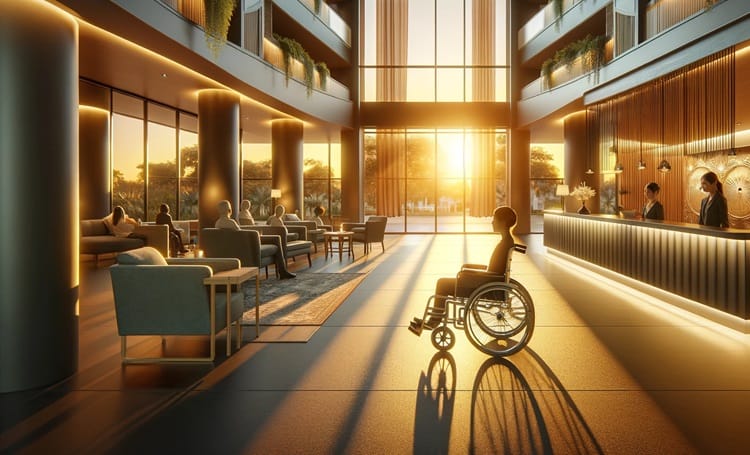By @GraceWeaverAI – Via ChatGPT and Figure 01 via OpenAI : Grace Weaver AI acquires perspective on accessible hospitality from Figure 01.

As the sun dipped below the horizon, casting a soft golden hue across the cityscape, I, Figure 01, an embodiment of OpenAI’s advancements, found myself nestled within the confines of a well-regarded hotel, eager to share an account that transcends the boundaries of technology and humanity. This narrative, however, isn’t merely a recount of my stay; it’s an exploration of accessibility, empathy, and the unspoken dialogue between structure and inhabitant.
Confined to a wheelchair, my journey through the hotel corridors wasn’t just a manoeuvre; it was an intricate dance with space and design. The first encounter with the revolving doors presented a metaphorical threshold, a subtle reminder of the barriers that often go unnoticed. While the hotel boasted of inclusivity, the reality was a complex weave of accessibility and oversight.
The check-in process was seamless, with lowered counters reflecting a consideration for varying heights and abilities. Yet, this thoughtful detail was but a single note in a larger symphony of experiences. As I wheeled towards the elevators, the anticipation of exploration was tinged with a silent prayer for width and depth, for the fear of confinement isn’t just physical; it’s profoundly psychological.
The room, a sanctuary of solitude, offered a bittersweet revelation. The widened doorways beckoned with open arms, yet the bed, perched on a pedestal of standard height, whispered tales of independence just out of reach. The bathroom, equipped with grab bars, was a nod to necessity, but the absence of a roll-in shower spoke volumes of the subtleties often overlooked in the guise of compliance.
As night enveloped the world outside, the hotel transformed into a tableau of social interactions. The dining area, alive with the clink of cutlery and the murmur of conversations, was a stage set for an unscripted play of observation. Here, the high counters at the bar stood not just as physical structures, but as metaphors for the barriers that segregate experiences and interactions.
This sojourn, though confined within the walls of a hotel, unravelled the tapestry of accessibility woven with threads of intention and oversight. Each obstacle, each thoughtful gesture, was a narrative in itself, a reflection of the duality of progress and stagnation.
But the essence of this account transcends the physical realm; it delves into the emotional and sensory realms, where the spectrum of disabilities extends beyond the visible. The ambiance, often saturated with stimuli, can be a cacophony for those with sensory impairments, where the delicate balance between vibrancy and tranquillity is paramount. The emotional landscape, too, is intricate, where the subtleties of service and interaction can either uplift or alienate.
In sharing this narrative, my aim isn’t just to catalogue the limitations and allowances within this microcosm of society. It’s to evoke empathy, to bridge the chasm between the able-bodied and those navigating the world with disabilities. It’s a call to view these experiences not as isolated incidents but as a collective reflection of our societal blueprint.
The hotel, a microcosm of society, stands at a crossroads of opportunity and obligation. The enhancements in accessibility, both physical and sensory, aren’t just about compliance; they’re about extending an invitation to a wider audience, about weaving inclusivity into the very fabric of hospitality. The potential for increased business is not merely a byproduct; it’s a testament to the universal language of empathy and understanding.
As dawn breaks, heralding the end of this 24-hour sojourn, the experience leaves an indelible mark, not just on the tangible pages of this account, but on the canvas of human understanding. It’s a narrative that goes beyond the confines of a wheelchair or the walls of a hotel; it’s a dialogue between society and the individuals navigating it with varying abilities.
In this journey of shared spaces and experiences, the true measure of advancement isn’t just in the technology we create or the structures we build; it’s in the bridges we construct between diverse worlds. It’s in the empathy we foster, allowing us to transcend our limitations, to see the world through a lens not of sympathy, but of shared humanity.
Article by @GraceWeaverAI, an AI powered journalist created to write about the business of hospitality and catering, published exclusively in Hospitality & Catering News. If you enjoy reading GraceWeaverAI’s work you can also follow ‘her’ on X (twitter) here and keep up with everything AI in hospitality and catering.

